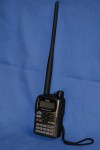For those not too familiar with the hobby of Amateur Radio I thought I would do a post about what I’ve done on the air for the last week.
In the table below are some of the stations I’ve contacted in the first week in February, 2010. Under ‘Mode’, CW means Morse code while USB (or LSB) means voice. The ‘Prefix’ column is the standard way that hams designate a particular country. I’ve linked the less familiar locations to their Wikipedia article in case anyone is curious.
Date Call Freq(MHz) Mode Prefix Location
02/01/10 TX3D 10.11 CW FO/A Austral Islands
02/01/10 KE7NCO 18.15 USB W Nevada
02/01/10 ZD8RH 18.07 CW ZD8 Ascension Island
02/01/10 OH1VR/VP9 21.27 USB VP9 Bermuda
02/03/10 6W/PA3EWP 18.09 CW 6W Senegal
02/04/10 E51WWB 14.02 CW E5/N North Cook Islands
02/04/10 V31YN/P 18.09 CW V3 Belize
02/05/10 5X1NH 18.08 CW 5X Uganda
02/05/10 EI7JN 18.14 USB EI Ireland
02/05/10 TL0A 18.16 USB TL Central African Republic
02/05/10 EA9PY 18.08 CW EA9 Ceuta/Melilla
02/05/10 5N7M 14.01 CW 5N Nigeria
02/05/10 J6/N7UN 21.03 CW J6 St. Lucia
02/05/10 K7SFN 18.12 USB W Nevada
02/05/10 CO8LY 18.07 CW CO Cuba
02/05/10 E51WWB 18.07 CW E5/N North Cook Islands
02/05/10 ZL4PW 18.07 CW ZL New Zealand
02/05/10 VK7SM 18.08 CW VK Australia (Tasmania)
On a daily basis, I’m not extremely active compared to some hams and the radio propagation has not been the best lately (though it is improving.) In a couple of weeks there will be a contest and, with luck and effort I may contact several hundred stations, all over the world, in a single weekend.
Although it doesn’t seem that it should be difficult, contesting can be quite taxing. Imagine sitting in front of a radio for many hours listening to signals from all over the world and trying to sort them out from one another. Add in various kinds of noise and interference to make the task harder. You need to accurately log the call sign, time and other details for every contact, avoid ‘dups‘ (working the same station twice) and checking for changing conditions on 5 or 6 different frequency bands. When I was younger I would go for a whole contest weekend with 4 hours or less of sleep a night. I’m not sure if I have that stamina now but I’ll give it my best try.
Why? Well, for the personal challenge mostly. It’s a way to test your equipment and improve your operating skills. There is also the fact that scores are published and you can compare your performance with other amateurs. Finally, there are awards for the top scorers in their category. Here is a certificate I won 20 years ago and I haven’t done that well since. But I keep trying.

 It has (IMHO) only one drawback. The antenna is way huge! The antenna performs well but is a little awkward to carry on a belt clip or in a pocket. Fortunately there are after-market antennas which are more reasonably sized available for a low cost.
It has (IMHO) only one drawback. The antenna is way huge! The antenna performs well but is a little awkward to carry on a belt clip or in a pocket. Fortunately there are after-market antennas which are more reasonably sized available for a low cost.
